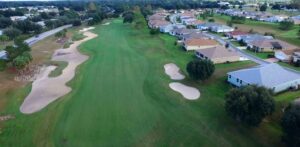Common Sense About Wildlife
Once upon a time, there was a coyote who was afraid of people. But over time, people began leaving food out for the coyote. People started taking pictures of the coyote. And people started accepting the presence of the coyote – as if it was welcomed. Next thing you know, the coyote was no longer afraid of people and was ready to settle down in its new home. Sound like a script for a future Disney movie? Unfortunately, it will not be a movie and will not have a happy ending.
Wildlife experts say this scenario is taking place. Instead of coyotes being taught to be afraid of people, the animals are discovering that places like On Top of the World may be a good place to live and raise families.
If residents want to prevent conflicts with coyotes, they must send a different message.
Management has posted signs about coyotes, the Community Service Office has purchased an inventory of sprays and noisemakers to deter coyotes, and this newspaper has published articles about coyote deterrence.
Senior Wildlife Assistance Biologist Heather LeBlanc with the Florida Fish and Wildlife Commission (FWC) encourages residents to reinforce coyotes’ natural fear of humans by removing attractive food sources and hazing or scaring coyotes when seen.
Some residents have been observed leaving food outside or along walking trails. This encourages the coyote’s persistence. Feeding activities of this nature violate state law, specifically Florida Administrative Code 68A-4.001, General Prohibitions (3).
Director Lynsey White of Human-Wildlife Conflict Resolution for the National Humane Society said, “We have to change our behavior that is contributing to this (problem).”
Lynsey said coyotes are naturally scared of people, but we are teaching them not to be afraid. The more familiar they become, the more trouble and conflict may happen.
The fact of the matter is that reporting such incidences is incredibly important. If residents start receiving citations or fines for leaving food out or deliberately feeding coyotes, it will begin to change their behaviors. Not making food readily available may lessen the comfort zone for coyotes.
Residents are encouraged to take clear pictures or clear videos of people feeding prohibited wildlife, such as coyotes. Feeding violations can be reported to the FWC’s Wildlife Alert Hotline at 888-404-3922.
If photos or videos are not possible, then write down a specific location and a specific time very precisely when the feedings are taking place. Authorities can use this information to witness violations in progress and issue warnings or citations to individuals engaging in illegal acts.
Lynsey said trapping and relocating coyotes does not work and is very expensive. Killing coyotes is not an option.
Biologists gave the example of the State of California spending millions of dollars in an attempt to remove coyotes from populated areas – that effort failed. The commission also reported that within 48 hours of relocating coyotes to a new territory, the animals are already gone, attempting to return to their original location from which they were taken.
Coyotes have established themselves in urban areas across the country, not just in Marion County, Florida.
For more information on dealing with coyotes, visit myfwc.com. If someone wants to report coyote feedings or request more information, they can contact the Northeast Regional Office at 352-732-1225.
If you enjoy walking your small dogs (or cats) early in the morning, partner up with some of your fellow neighbors and their pack on the walk. The larger numbers also intimidate coyotes. It is also a great strategy to make new friends. Ensure pets are walked on a short, non-retractable leash. Carry something that makes noise, like a small air horn. Hazing, as this is called, really sends a message to the wildlife to move away. Over time, as coyotes realize they are not welcome, they tend to migrate to more hospitable areas away from residential areas.
Residents should avoid contact with these animals. For further information on this program, please visit MyFWC.com/coyote.
Community Updates
Food & Beverage: For June, Blazin’ Bites Food Truck will be set up at the Recreation Center pavilion, Monday through Friday, from 11 a.m. to 3 p.m.
In addition to The Pub being open, poolside cookouts will be scheduled from Thursday through Sunday from 11 a.m. to 3 p.m. at the Recreation Center, featuring rotating menus.
The Club at Candler Hills is now closed on Mondays through Monday, Nov. 3. To better serve our customers, new hours are Tuesday through Sunday from 11 a.m. to 8 p.m. The restaurant will be closed for maintenance from Monday, July 28, through Monday, Aug. 11, reopening on Tuesday, Aug. 12.
The Summit in Longleaf Ridge: The Building has been completely dried in, and the next steps are the mechanical systems of the building and exterior metal framing. As a reminder, this will be a 20,000-square-foot amenity with a 6,000-square-foot ballroom, card room, a large main pool, and a resistance pool. The estimated completion of this project is forecasted for winter 2026.
Azura Fitness Center in Candler Hills: Sitework has started on this project inside the construction fence. Construction of the building is estimated to begin this summer. We appreciate your interest in the project but kindly request that you stay outside the construction fence. This 8,000-square-foot facility will feature a large pool and is expected to be completed by the end of the year.
Recreation Center: There are three construction projects underway for this amenity. A “facelift” and update of the building and landscape in the front are in the works. At press time, we should be nearing the completion of the covered pickleball courts and the small pavilion near the parking lot.
Woodworking Shop: The new, expanded wood shop building is planned for the parcel of land just north of the existing Bay Laurel Center CDD Water Plant #1. This 7,200-square-foot building will be constructed on the site where the Eco Gardeners Club garden was located, providing additional space for our growing wood shop membership. It will also feature separate suites and serve as a general-purpose space for activities such as table tennis, ballet, and other uses.
Eco Gardeners Garden:
As mentioned previously, a new, convenient location has been selected for the current SW 99th Street Eco Gardeners garden. This relocation offers the added benefit of additional garden plots. Garden club members have until Friday, Aug. 1, to vacate the previous SW 99th Street garden.
Candler Hills Golf Club: The Candler Hills Golf Club closed in early May to begin a renovation to the playing surfaces. The crews have been busy excavating the putting surfaces and preparing the course for new turf. New landscaping will be installed around the Golf Shop, restaurant, and community center. While the goal is to reopen sometime later this year, the weather will be the main driver in determining this timing. While this work is being performed, the Golf Shop will have reduced hours but will still be open Monday through Friday, 8 a.m. to 4 p.m.
Irons 9 Golf Course: Construction has begun on the new nine-hole pitch and putt golf course near SW 80th Street and SW 92nd Court Road. Look for an opening on this project near the end of the year.
Gatehouse (SW 92nd Court Road): A new, automated gatehouse will be erected to replace the temporary gate at SW 80th Street. The design team has been chosen, and work has begun on the permit drawings for this project. This automated gate will include a dedicated lane for guests to interact with the virtual gate attendant and a bypass lane for resident owners. At the time of writing, there is no projected start date. Once plans are submitted to the building department, there will be a better window to determine a start date.
Bay Laurel Center Community Development District: The construction of Bay Laurel’s new office building in Calesa is anticipated to be completed by late summer. We encourage all residents to remain informed regarding the timing of the transition to the new facility.
Adjacent to this site will be Water Treatment Plant #4, a very advanced water treatment facility servicing both all of Calesa and the entire Bay Laurel Center CDD water transmission system.
Bay Laurel Center CDD has begun the demolition of the South Water Reclamation facility. It is anticipated to be completed by September. Once the plant is entirely demolished, the site will be graded, and a new warehouse facility will be built. This warehouse will store piping in sizes up to 36” in diameter, as well as pipe fittings and fire hydrants will be inventoried onsite.
Dog Park (SW 99th Street Road): The dog park underwent a revamping last month. The project’s scope included replacing the turf with new drought-tolerant bermudagrass, landscaping around the perimeter, pruning trees on both the interior and exterior of the park, and an overall refresh. The new turf should provide for greater recovery from the wear and tear of our furry little friends and improve the overall appearance of the area.
Roadway Improvements
SW 90th Terrace: By now, you will have likely seen that work in this area has commenced. There will be some light clearing near the Weybourne Landing entry to make way for the multi-modal path extension, which is set to begin taking shape this month. Watch this space for further announcements as to the opening of the pathway.
Work has also begun on the extension of SW 90th Terrace from SW 79th Street to SW 63rd Street Road. Residents in and around Weybourne Landing can expect increased construction traffic and activity in this area during the project’s duration. The contractor’s goal is to complete this roadway before the major construction of 80th Avenue begins, providing an alternative route of travel north.
SW 92nd Court Road: Those of you keeping tabs in the vicinity of this project will have seen that approximately one-half of the roadway has been paved, including a new multi-modal path. There is still considerable work to be done to complete the roadway and fill in the existing landscape, but we have reached a major milestone. This roadway is expected to be completed by the end of the year and will provide an alternative route of travel from Longleaf Ridge to Candler Hills and The Town Square.
SW 80th Avenue: Sources at the Marion County Engineering Department assure residents in and around SW 80th Avenue that construction is slated to begin in late 2025 to widen the road from two to four lanes. The completion period is approximately two years from the start.
Landscape Update
July is typically a wetter-than-normal month, making it a great time to reduce your irrigation usage. Florida can experience routine afternoon thunderstorms that provide sufficient moisture to keep your lawn and landscape alive. If you haven’t checked your rain shutoff device recently or find your irrigation running in the rain, now would be a good time to do so. The easiest way to check the sensor is to turn your irrigation on, then spray water using a garden hose at the sensor until the irrigation turns off. If it does not, you may have a faulty sensor that needs to be replaced. The cost of replacement is far less than the cost of the wasted irrigation water.
Practical Preventative Home Maintenance
From June through October, your air conditioning systems will be running full tilt. These systems don’t operate by themselves without proper care and maintenance. For a helpful short video on practical steps you can take to service your air conditioning system and keep it functioning efficiently, visit OTOWInfo.com > Resources > Homeowner Maintenance > Air Conditioning. These include changing the filters monthly and pouring vinegar into the main condensate pan to keep the main drain flowing without obstruction. Check the outflow outside near the compressor. If you don’t see the cleaning solution coming out, the drain line is blocked and needs immediate attention.
At least once a year, have your air conditioning serviced by a professional. They will clean the coils in both the air handler (located inside the home) and the compressor (located outside), as well as clean electrical connections and ensure the motors are operating properly.




